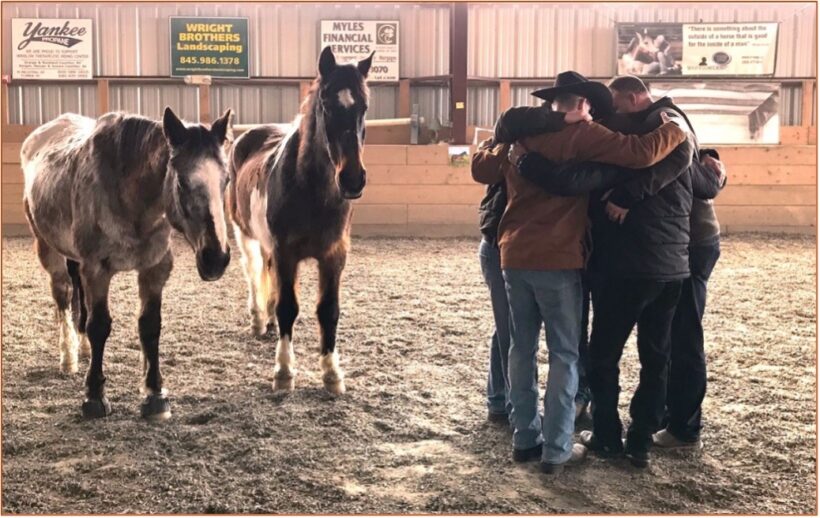Sitting outside on a finally warm sunlit spring day, a robin chirps for attention from a blossoming tree nearby and seems to be looking directly at me. It feels as if the insistent noise is a message, as if this bird remains fixed on conveying some very important news. The robin is equally aware of me, as I am of her. This routine scene is probably overlooked by many humans as researchers and scientists have increasingly been raising questions about consciousness in all species of animals, and likely more.
Anyone correctly stewarding our environment, fauna, flora and each other, understands the mutually caring relationship that develops sometimes quickly, sometimes over time between our environment, animals, and humans. Recent articles verify the interactive dynamics which are increasingly noted, studied, and expressed. Dr. Carl Safina, a Long Island ecologist, author, researcher, professor has been making the case for animal consciousness and their subjectivity for years. (https://www.safinacenter.org/)
One convincing example of animal consciousness comes through the research, beliefs and work of Eva J. Usadi, MA, BCD, CGP Founder/Executive Director of Trauma and Resiliency Resources, Inc. a 501c3 public charity dedicated to treating line of duty and service-connected Post Traumatic Stress Disorder and Moral Injury in First Responders and Combat Veterans. She is also the creator of TRR’s Warrior Camp® program. I spoke with Ms. Usadi several months ago after attending a day long online workshop in October 2023 on TRR’s Warrior Camp® Program that uses a particular equine intervention therapy with horses as part of a psychotherapy team: mental health professional, Eva Usadi and equine specialist professional, Alejandra Lara. Alejandra is a lifelong horsewoman, originally from Chile, who now resides in Utah where she has her own practice and horses. She has been working with TRR for 8 years, has helped to design some of the programs used, as well as having partnered in the arena with Eva in 13 programs thus far.
Besides being exceptionally sensitive, horses can reflect emotions as well as behaviors. By watching what the horses do, therapists understand what is going on with their human clients.
Ms. Usadi emphasizes the extraordinary sensitivity of horses, dolphins, and elephants as animals of prey, like the conditioning of the human subjected to the violence found in traumatic group situations such as war, emergencies, disasters. All work with the horses takes place on the ground only – there is no riding. She notes the group of horses in the arena and highlights that it is in the herd of horses where the wisdom is found.
The herd with its collective, communicative wisdom engages to potentially change the consciousness of the participants, particularly in the case of Combat Veterans who may well identify with herd behavior since they live, work, train and engage in war as members of a unit, needing to reestablish a level of connection to heal from Moral Injury. In the particular context of combat trauma, Moral Injury exists. Used in TRR, Ms. Usadi defines it “an existential or spiritual crisis that can be the consequence of having been trained to override the intrinsic aversion to the taking of human life. It can also be the result of having engaged in combat operations, however necessary at the time, during which one’s ethics and actions did not align.”
Just as Ms.Usadi verifies that horses claim their own place in the herd, I recall the example of a combat veteran given during the conference who was thinking of ending his life. His story was that a particular horse chose to engage with him, walked with him, stayed with him, gently allowing his attuned presence to be felt by the veteran. The result of this interaction was the veteran deciding that day to not take his life, with that particular horse’s perception and behavior as determining factors in his decision. For me, hearing and understanding more about the horse’s level of awareness, sensititivity and determination clarifies the practices of Eva Usadi and Alejandra Lara, as well as the ideas and writings of docents like Dr. Carl Safina and scientist-theologian Thomas Berry.
In reflection, certain thoughts from Thomas Berry deepen and expand our understanding of the world in which we participate and the power of our interactions, “The Universe is a communion of subjects, not a collection of objects.”[i] And each participant is a subject, different, engaging on active, rather than passive levels, worthy of the place held in this nexus.
During this month of May, TRR is a partner to a national campaign to raise awareness about horses as psychotherapy partners: https://seenthroughhorses.raisely.com/t/trauma-resiliency-resources










